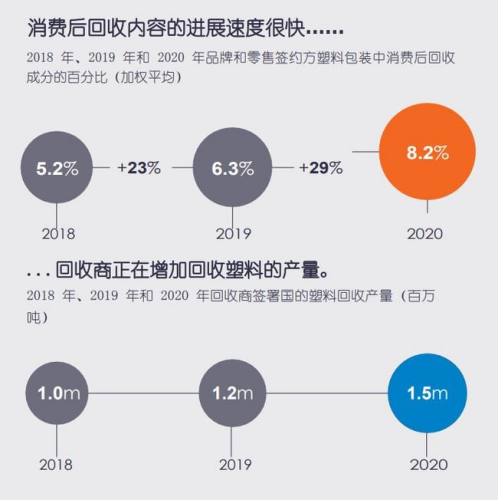The Ellen MacArthur Foundation and the United Nations Environment Programme released the latest data showing that brands and retailers of the New Plastics Economy Global Commitment (hereinafter referred to as the "Global Commitment") have reduced the use of virgin plastic in packaging for two consecutive years. The Ellen MacArthur Foundation and the United Nations Environment Programme jointly stated that three years after the launch of the New Plastics Economy Global Commitment, the use of virgin plastic by signatories of the commitment seems to have peaked and is currently on a downward trend.

The Global Commitment adds mandatory virgin plastic reduction targets in 2021, and all 60+ brand and retail signatories have set targets. The new commitment will further consolidate and accelerate the downward trend in the use of virgin plastics. The new commitment proposes that by 2025, the absolute use of virgin plastics will drop by nearly 20% compared to 2018.
Reducing the use of virgin plastic is a welcome trend, but brands and retailers are mainly focused on gradually replacing virgin plastic with recycled plastic in their current plans and future planning. However, this is only part of the solution and does not address the total amount of plastic packaging put on the market. Currently, efforts to eliminate single-use packaging remain insufficient, with less than 2% of signatories' plastic packaging being reusable, and more than half of the signatories having a zero reuse rate for their plastic packaging.

Voluntary initiatives such as the Global Commitment have begun to bring about change, but a large number of companies and countries have realized that voluntary initiatives alone are far from enough to solve plastic pollution. The signatories of the Global Commitment only cover 20% of the world's plastic packaging. This requires a coordinated global response mechanism so that the entire industry and all government departments can take action at scale faster.
Calls for a global agreement on plastic pollution are growing louder. More than 80 leading companies and 119 governments have called for a global agreement to tackle plastic pollution, and more than 2 million people have signed a public petition in support.
A key moment will be UNEA 5.2 in February 2022, when governments will discuss the next steps, including whether to start intergovernmental negotiations on a global agreement.
“The Global Commitment shows us that concerted voluntary action by actors across the value chain, including governments, has begun to reverse the global fight against plastic pollution,” said Inger Andersen, Executive Director of the United Nations Environment Programme. “All signatories are reporting their progress in a transparent manner and using agreed indicators, which is commendable and worth learning from. These frontrunners have also demonstrated that we can decouple the many benefits of plastic from the use of virgin plastics, and these groundbreaking actions can be driven and scaled up through a comprehensive, inclusive, global approach.”
 Current location:
Home >
News >
Industry News >
Calls for a global deal on plastic pollution are gaining momentum
Current location:
Home >
News >
Industry News >
Calls for a global deal on plastic pollution are gaining momentum
